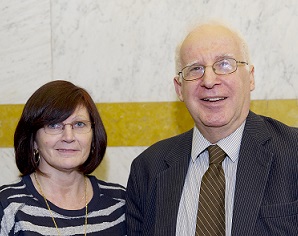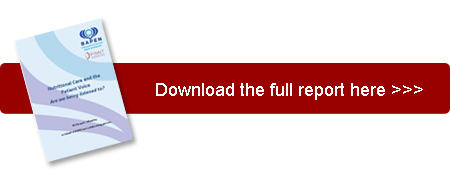Patient Voice Report
17/03/2014
' class='news-img'/>
Patients Still not being listened to
New Report confirms lack of progress in delivering improved patient-centred care
for vulnerable patients with complex nutritional needs
March 17
th 2014: A jointly authored Report (
Nutritional Care and the Patient Voice: Are we being listened to? ) published today by BAPEN and PINNT(authors Marinos Elia and Carolyn Wheatley as shown) with involvement and endorsement from nine other patient organisations
1, confirms that patients and carers feel little progress has been made in delivering improved patient-centred care and worryingly with some feeling there has been a recent deterioration in care.

Despite the publication of many new reports, policies and reviews and the ongoing reorganisation of the health service to improve patient care, there remains uncertainty from many patient groups as to how much real progress has been made. Clear recommendations published by BAPEN in 2008
2, which reported on general aspects of nutritional support in the context of other considerations, including; shared decision-making; tailoring of healthcare services to the patients needs and continuity of care. However, despite its importance, nutritional care has not been focussed on as a central theme.
The patient voice needs to be heard at every level of their care and across all spectrums of nutritional care; from their first interaction in general practice to interaction with healthcare professionals in the hospital setting and for those requiring long term medical care. There is a lot of talk about listening to patients, but it is clear that this is not happening. We believe that patient organisations such as ourselves and those who collaborated with us on this Report, along with patients, families and carers can contribute to improving continuity of care if we are involved and included in a meaningful way - particularly in reducing emergencies and where patients are in transition between services. Carolyn Wheatley, Chair - PINNT
BAPEN and PINNT collaborated with nine patient organisations and two NHS Trusts to compile the Report
Nutritional Care and the Patient Voice: Are we being listened to? , which looked to address three key issues:
-
whether adequate priority has been given to nutrition and hydration services and whether they have improved in the last few years
-
whether or not the patient experience associated with nutritional support has improved
-
whether or not inequities in nutritional care have been adequately addressed
A questionnaire to obtain the views and insights of patients/carers on these three areas of health and social care was devised and sent out to the collaborating organisations, with a follow up round-table meeting held to discuss the results and clarify issues raised prior to the publication of the Report.
All of the organisations that collaborated in the compilation of the Report agreed that much more needs to be done to improve the management of patients with nutrition and hydration problems. Patients, families, carers and patient organisations represented in this Report stand ready to be involved directly in improving patient care. They believe they are a valuable resource with whom closer interaction can benefit healthcare organisations.
Having the opportunity and time to listen to patients and carers at the round table discussion was invaluable in sharing experiences and understanding what it really feels like to access nutrition services. Empathy took on a new meaning as we all began to fully understand the importance of how we make connections with patients and their carers. Some of the most important parts of the discussion for me were the in-depth conversations and the ideas that were generated about efficient use of resources and removal of waste from the system. The research revealed that patients are clear and concerned about elements of care pathways that don t add value, and that they have real understanding about the complex challenges that we as healthcare professionals face in the daily delivery of healthcare. They have valuable contributions to make in terms of and (most importantly) their proposed solutions for improvements and integrated care. Listening and working closer with patients would benefit us all. Patients are most definitely a valuable resource with whom closer interaction could benefit all. Dr Ailsa Brotherton, BAPEN Quality Group
ACTION
Tragic outcomes summarised last year by the Francis Report (and emphasised in the Berwick Report) have raised specific concerns about nutrition and hydration and highlighted the need for a culture change based on leadership, training and information to improve patient experience and safety and the importance of patient dignity and involvement. The findings of the
Nutritional Care and the Patient Voice Report further confirmed the need for action and acted as a trigger for the development of BAPEN s new Malnutrition Matters: a commitment to act guide, also launching today
3. The new guide, sets out clear and simple priorities for each level of the healthcare system to ensure appropriate commissioning and delivery of good nutritional care.
References:
1. Elia M, Smith R, on behalf of BAPEN and its collaborators. Improving nutritional care and treatment: perspectives and recommendations from population groups, patients and carers. A report from BAPEN with 18 collaborating partners from the voluntary sector. Available at: http://www.bapen.org.uk/pdfs/improv_nut_care_report.pdf, 2009: p 29.
2. Malnutrition Matters: a commitment to act guide can be downloaded from the BAPEN website www.bapen.org.uk
Nutritional Care and the Patient Voice Report can be downloaded here,
see image below.
For more information, interviews and comment:
Charlotte Messer or Helen Lawn
01892 525141/07928 700277/07879 818247
BAPEN
BAPEN is a charitable association that raises awareness of malnutrition and works to advance the nutritional care of patients and those at risk from malnutrition in the wider community.
www.bapen.org.uk
PINNT is a core group of BAPEN and has been since BAPEN s inception.
The association is made up of influential professional and patient organisations, which work in collaboration to improve and deliver safe and effective nutritional care throughout the UK:
-
BAPEN Medical is primarily aimed at doctors but is open to all those with an interest in clinical nutrition. Its aims are: Education and training of clinicians at all levels; to encourage research and development and to foster collaborations between members research groups; to foster inter-disciplinary links and collaboration between medical specialties; to foster multi-professional links and collaboration between health professionals. www.bapen.org.uk
-
BAPEN regional reps are a multidisciplinary team of professionals working in the field of nutrition. Providing a local resource for education, training and support in England, Scotland, Wales and Northern Ireland, they can be contacted via the BAPEN website.
-
The British Pharmaceutical Nutrition Group (BPNG) is a specialist group for primarily pharmacists and scientists, but open to all with an interest in clinical nutrition. The group was founded in 1988 following growing concerns about the stability of parenteral nutrition feeds. BPNG has published position statements on multichamber bags , in-line filtration of PN and calcium phosphate stability. Education is now a focus for the group which runs multidisciplinary fundamental parenteral nutrition and advanced nutrition courses. Publications include the Handbook for drug administration via enteral feeding tubes and a competency framework for pharmacists working within clinical nutrition. www.bpng.co.uk
-
The British Society of Paediatric Gastroenterology, Hepatology and Nutrition (BSPGHAN) provides professional leadership and promotes standards of care for children with nutritional, gastrointestinal and hepatological disorders. Its membership includes consultants and specialist trainees in paediatric gastroenterology, hepatology and nutrition as well as specialist dietitians, nurses and nutrition pharmacists. The society supports research, training and education for members and the development of standards of care for children with nutritional disorders; it also gives advice and support to implement child-centred strategies to deliver nutrition assessment and nutrition support through the Nutrition Intestinal Failure Working Group. www.bspghan.org.uk
-
The National Nurses Nutrition Group (NNNG) The NNNG was established in 1986. It is a registered charity which aims to promote education and the nursing role in nutrition and related subjects for the nursing profession for the benefit of patients in hospital and community environments. Over recent years the focus of the group has widened to reflect the increasing profile of nutrition: from screening strategies and mealtimes to the complex nature of artificial feeding. www.nnng.org.uk
-
The Parenteral and Enteral Nutrition Group (PENG) is a specialist group of the British Dietetic Association. The PENG strives to train, educate, support and represent dietitians working in oral, enteral and parenteral nutrition support in all care settings. The group acts as the professional voice on matters pertaining to nutritional support and is a founder group of BAPEN. Members are registered dietitians who aim to ensure that nutritional support for patients is safe and clinically effective both in hospital and at home. www.peng.org.uk
-
PINNT is the UK support group for patients on home enteral or parenteral nutrition. Established over 25 years ago, PINNT has grown into a community that provides genuine understanding to help individuals and carers, deal with the many challenges faced on artificial feeding at home. They also work closely with healthcare professionals, suppliers and manufacturers in order to enhance the patient journey. The PINNT network provides a unique and united voice to campaign for a better, flexible and safer service. www.pinnt.com

Download
Back